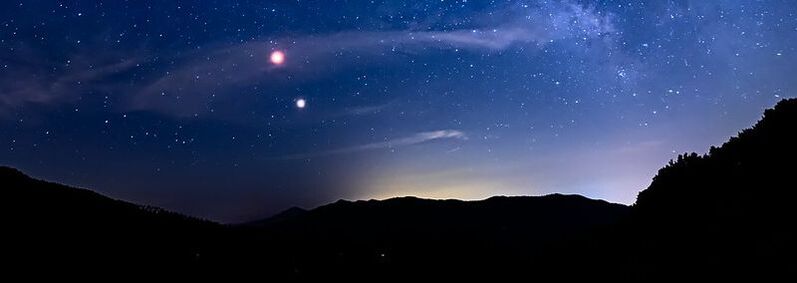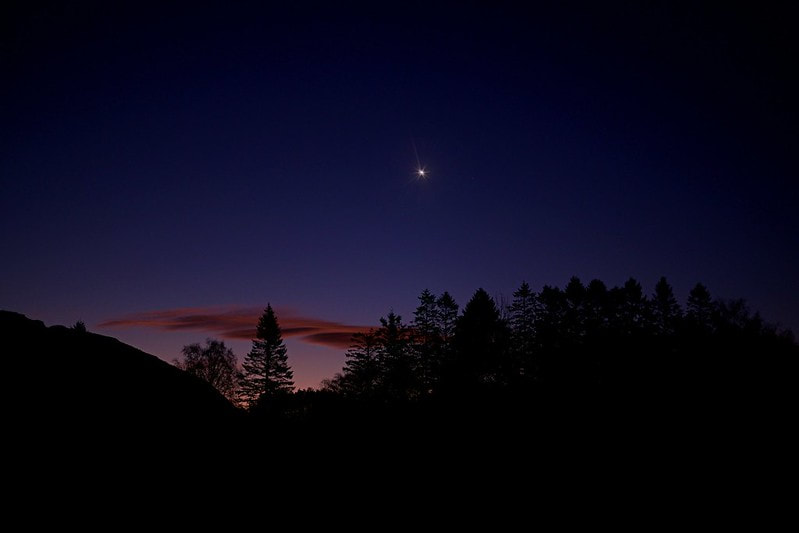Divine Flexibility: Being Seekers Rather Than Settlers
by Teri Daily
|
In the time of King Herod, after Jesus was born in Bethlehem of Judea, wise men from the East came to Jerusalem, asking, “Where is the child who has been born king of the Jews? For we observed his star at its rising, and have come to pay him homage.” When King Herod heard this, he was frightened, and all Jerusalem with him; and calling together all the chief priests and scribes of the people, he inquired of them where the Messiah was to be born. They told him, “In Bethlehem of Judea; for so it has been written by the prophet: ‘And you, Bethlehem, in the land of Judah, are by no means least among the rulers of Judah; for from you shall come a ruler who is to shepherd my people Israel.’” Then Herod secretly called for the wise men and learned from them the exact time when the star had appeared. Then he sent them to Bethlehem, saying, “Go and search diligently for the child; and when you have found him, bring me word so that I may also go and pay him homage.” When they had heard the king, they set out; and there, ahead of them, went the star that they had seen at its rising, until it stopped over the place where the child was. When they saw that the star had stopped, they were overwhelmed with joy. On entering the house, they saw the child with Mary his mother; and they knelt down and paid him homage. Then, opening their treasure chests, they offered him gifts of gold, frankincense, and myrrh. And having been warned in a dream not to return to Herod, they left for their own country by another road. Matthew 2:1-12* * New Revised Standard Version Bible, copyright © 1989 National Council of the Churches of Christ in the United States of America. Used by permission. All rights reserved worldwide. |
As a pediatrician, I spent a lot of time talking with parents about things like how to practice “time-out” with consistency, what the nutritional needs of a two-year-old are, whether or not it’s OK for a baby to sleep in the same bed as her parents, and the ever popular question: how can I get my child to sleep through the night? I began discussing these things with care-givers before I had children of my own, and I wondered whether or not my advice would change when I became a mother. I was surprised to find that it did not change much at all. However, I did find myself adding one sentence. At the end of a conversation about ideal parenting, I now added: “And sometimes you just do the best you can.” Perhaps parenting had taught me compassion for other parents. Even more, I think it taught me the value and the necessity of flexibility.
Flexibility is not as easy to practice as we like to think. We don’t have to look any further than the New Year resolutions most of us make to see that we’re very much the products of our ingrained habits. One might say that habits are often harder to change than the tire of an eighteen-wheeler stuck knee-deep in mud, because why else would the same items appear on our list of resolutions year after year? (Or at least they do on mine…) My list is often something along the lines of become more organized, get into better shape, spend more time with family, be more disciplined in my prayer routine, be more focused, and so on. It’s the same every year, and I don't think I'm alone in this. For a culture that prides itself on being fast-paced and adaptable, maybe we’re not as open to change as we’d like to think.
We often hear that cleanliness is next to godliness. That may be true. But if cleanliness is next to godliness, then flexibility is at least somewhere in the near vicinity. That might seem a little counter-intuitive in the religious world. We usually understand faithfulness as being related to steadfastness, constancy, our refusal to be moved. And it’s usually those who are “seekers,” those who are willing to go new places and step outside the accepted norm – those are the people stereotyped as shallow, selling out to the current culture, or not being strong in their faith. But the story of the magi turns that stereotype upside-down.
This story of the wise men (or wise people, as I like to say) is the gospel passage read on the Feast of Epiphany, which takes place on January 6th. The word “epiphany” means a divine manifestation or revelation. What we find in the gospel reading is that revelation happens to those we would least expect. It’s the seekers in this story who actually see Christ, not those of the religious establishment. It’s the magi from the East who make it to the manger, not the scribes and chief priests who hold the promises of Israel.
Now it would be easy to jump to the assumption that the “wise persons” in the story are the ones we should strive to be like, not the religious leaders of Jerusalem. But to make such an assumption would be to do exactly what I don’t want to do. I don’t want to make a false dichotomy between the religious establishment and the seekers, the conservers of tradition and the innovators, those who hold steadfast to the promises of their faith and those who are open to new possibilities. We shouldn’t have to choose between putting ourselves in the position of the scribes and chief priests or that of the magi because, in reality, we’re both at the same time. We are both those who hold the stories and promises of our faith and those who never cease to look for Christ. And that can be a difficult line to walk; it can be hard to live in that tension.
Churches and devout believers are famous for being resistant to change, not in principle and usually not intentionally. But our faith is important to us and we hold tightly to it, guarding it and protecting it as vigorously as we can. In the process, we sometimes become convinced that we hold all the answers – that we know the right way to worship, the essential doctrines, or the path to salvation.
The danger, though, is that too often we lose perspective and end up worshiping our own religious constructs instead of worshiping God. We hold so tightly to our own understanding and ideas that we risk becoming immune to the Spirit’s prompting – like a congregation one of my seminary professors spoke of, a congregation that had become so inwardly-focused and self-absorbed that “the Holy Spirit couldn’t get in that place with a crowbar.”
The truth is that, as Christians, we never stop searching for Christ. In fact, it’s our steadfast faith that enables us to leave our comfort zones and look in places we might never have ventured on our own. It’s the Christ in us that leads us to search for the Christ in the world, knowing that when we find him (and we will) our lives will be changed. It’s our trust in the promises of God that allows us to travel a road different from the one on which we arrived, different from the one by which we had planned to return home. We can take this different road because, trusting in the faith we hold so dear, we know that we will find God all along this new road as well. We’re both the chief priests and the magi in this story.
I want to share with you a poem by Macrina Wiederkehr. She writes:
It seems to me Lord
that we search
much too desperately
for answers
when a good question
holds as much grace
as an answer.
Jesus
you are the Great Questioner
Keep our questions alive
that we may always be seekers
rather than settlers.
Guard us well
from the sin of settling in
with our answers
hugged to our breast.
Make of us
a wondering
far-sighted
questioning
restless people
And give us the feet of pilgrims
on this journey unfinished. [1]
As we come to a new year and the possibilities stretch out in front of us, we’re called, both individually and as a community, to divine flexibility – to open ourselves to the work of the Spirit and to the newness that awaits us. May God give us the strength to resist the temptation of thinking we hold all the answers. May God give us the wisdom to ask for divine guidance. And may God give us the grace to be both full of faith and always seeking.
[1] From Seasons of Your Heart: Prayers and Reflections, Revised and Expanded by Macrina Wiederkehr, New York: HarperCoillins, 1991.
Flexibility is not as easy to practice as we like to think. We don’t have to look any further than the New Year resolutions most of us make to see that we’re very much the products of our ingrained habits. One might say that habits are often harder to change than the tire of an eighteen-wheeler stuck knee-deep in mud, because why else would the same items appear on our list of resolutions year after year? (Or at least they do on mine…) My list is often something along the lines of become more organized, get into better shape, spend more time with family, be more disciplined in my prayer routine, be more focused, and so on. It’s the same every year, and I don't think I'm alone in this. For a culture that prides itself on being fast-paced and adaptable, maybe we’re not as open to change as we’d like to think.
We often hear that cleanliness is next to godliness. That may be true. But if cleanliness is next to godliness, then flexibility is at least somewhere in the near vicinity. That might seem a little counter-intuitive in the religious world. We usually understand faithfulness as being related to steadfastness, constancy, our refusal to be moved. And it’s usually those who are “seekers,” those who are willing to go new places and step outside the accepted norm – those are the people stereotyped as shallow, selling out to the current culture, or not being strong in their faith. But the story of the magi turns that stereotype upside-down.
This story of the wise men (or wise people, as I like to say) is the gospel passage read on the Feast of Epiphany, which takes place on January 6th. The word “epiphany” means a divine manifestation or revelation. What we find in the gospel reading is that revelation happens to those we would least expect. It’s the seekers in this story who actually see Christ, not those of the religious establishment. It’s the magi from the East who make it to the manger, not the scribes and chief priests who hold the promises of Israel.
Now it would be easy to jump to the assumption that the “wise persons” in the story are the ones we should strive to be like, not the religious leaders of Jerusalem. But to make such an assumption would be to do exactly what I don’t want to do. I don’t want to make a false dichotomy between the religious establishment and the seekers, the conservers of tradition and the innovators, those who hold steadfast to the promises of their faith and those who are open to new possibilities. We shouldn’t have to choose between putting ourselves in the position of the scribes and chief priests or that of the magi because, in reality, we’re both at the same time. We are both those who hold the stories and promises of our faith and those who never cease to look for Christ. And that can be a difficult line to walk; it can be hard to live in that tension.
Churches and devout believers are famous for being resistant to change, not in principle and usually not intentionally. But our faith is important to us and we hold tightly to it, guarding it and protecting it as vigorously as we can. In the process, we sometimes become convinced that we hold all the answers – that we know the right way to worship, the essential doctrines, or the path to salvation.
The danger, though, is that too often we lose perspective and end up worshiping our own religious constructs instead of worshiping God. We hold so tightly to our own understanding and ideas that we risk becoming immune to the Spirit’s prompting – like a congregation one of my seminary professors spoke of, a congregation that had become so inwardly-focused and self-absorbed that “the Holy Spirit couldn’t get in that place with a crowbar.”
The truth is that, as Christians, we never stop searching for Christ. In fact, it’s our steadfast faith that enables us to leave our comfort zones and look in places we might never have ventured on our own. It’s the Christ in us that leads us to search for the Christ in the world, knowing that when we find him (and we will) our lives will be changed. It’s our trust in the promises of God that allows us to travel a road different from the one on which we arrived, different from the one by which we had planned to return home. We can take this different road because, trusting in the faith we hold so dear, we know that we will find God all along this new road as well. We’re both the chief priests and the magi in this story.
I want to share with you a poem by Macrina Wiederkehr. She writes:
It seems to me Lord
that we search
much too desperately
for answers
when a good question
holds as much grace
as an answer.
Jesus
you are the Great Questioner
Keep our questions alive
that we may always be seekers
rather than settlers.
Guard us well
from the sin of settling in
with our answers
hugged to our breast.
Make of us
a wondering
far-sighted
questioning
restless people
And give us the feet of pilgrims
on this journey unfinished. [1]
As we come to a new year and the possibilities stretch out in front of us, we’re called, both individually and as a community, to divine flexibility – to open ourselves to the work of the Spirit and to the newness that awaits us. May God give us the strength to resist the temptation of thinking we hold all the answers. May God give us the wisdom to ask for divine guidance. And may God give us the grace to be both full of faith and always seeking.
[1] From Seasons of Your Heart: Prayers and Reflections, Revised and Expanded by Macrina Wiederkehr, New York: HarperCoillins, 1991.



